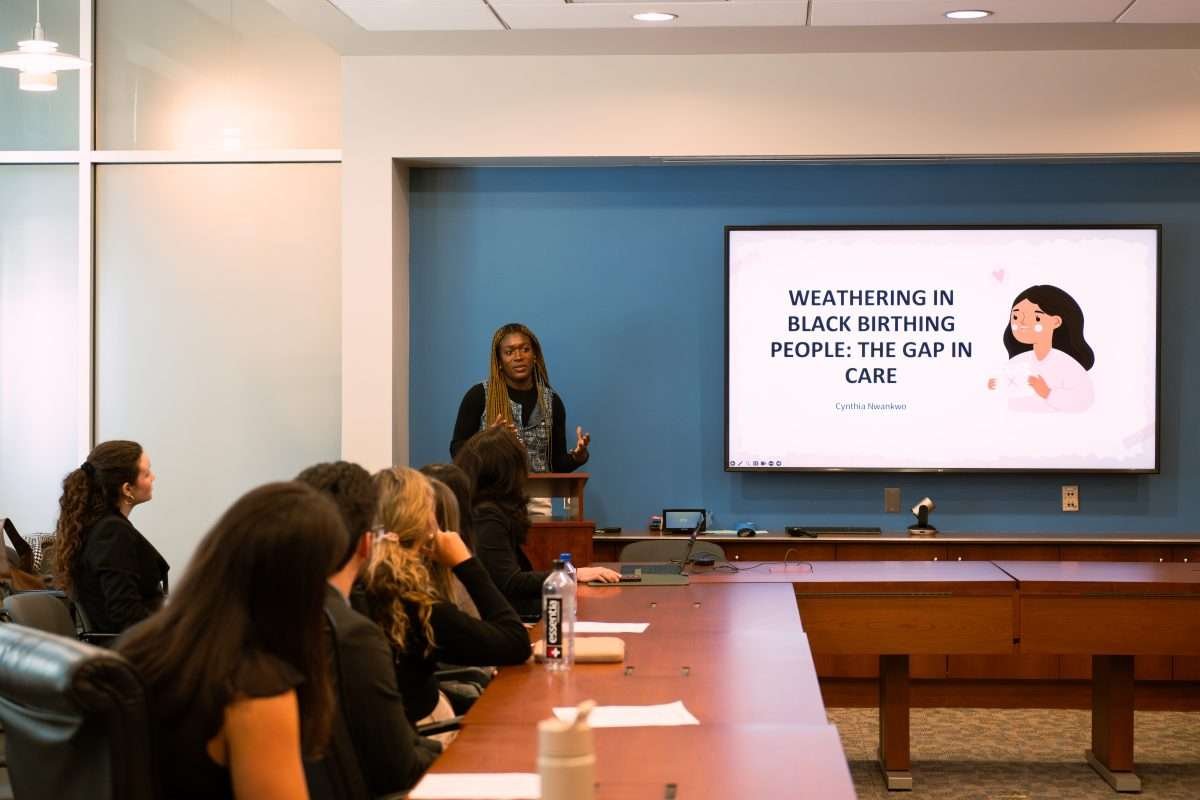CHAP + Princeton: Advancing Birth Equity

Nearly every Monday and Tuesday this winter and early spring, CHAP Co-Directors Raquel Mazon Jeffers, Wendy McWeeny, and Program Manager Jhenielle Reynolds could be found on the campus of the Princeton School of Public and International Affairs (SPIA) introducing undergraduate students to the maternal mortality crisis in New Jersey. In addition to studying the conditions surrounding the state’s historically poor maternal health outcomes, students also had the chance to explore policy and practice components of the birth equity movement in conversation with community leaders, practitioners, course facilitators, and one another.
For Wendy, engaging Princeton students in the work to advance equity for birthing people has been especially meaningful. “As a SPIA alum, returning as a faculty member and getting to know and work with students whose ideas for creating lasting and impactful change we see so much potential in, has been deeply inspiring.”
Thanks to the collective efforts of advocates and policymakers, the Murphy administration, and First Lady Tammy Murphy, a multipronged effort to make New Jersey the safest place in the nation to give birth and raise a baby is underway. For their final project, the Princeton students met with First Lady Murphy, New Jersey’s new Maternal and Infant Health Innovation Authority President Asare, Nurture NJ Director Ria Rodney, and Dr. Kaitlan Baston, New Jersey Commissioner of Health, at the Economic Development Authority in Trenton to discuss strategies for improving maternal health outcomes throughout the state, covering topics including enhancing maternal nutrition and food security, the impact of interpersonal violence on birth outcomes, and improving maternal health care for incarcerated women.
“New ideas and perspectives are key to finding novel ways to advance our work, and I am incredibly thankful for the Community Health Acceleration Partnership for creating this opportunity for innovation by spotlighting this critical issue throughout the term,” said First Lady Tammy Murphy. “I have no doubt that the findings and presentations of these future leaders and policymakers from Princeton University’s School of Public and International Affairs will help us transform New Jersey’s maternal and infant health landscape.”
Photos, Top row, L: Students Aditi Desai and River Reynolds. R: Stephanie Lagos, Tammy Murphy, and Lisa Asare. Photos by Guillermo Viera, Princeton SPIA. Bottom row, L: Student Cynthia Nwankwo. R: Presentation participants and attendees. Photos by Guillermo Viera, Princeton SPIA
ABOUT PRINCETON UNIVERSITY SCHOOL OF PUBLIC AND INTERNATIONAL AFFAIRS
The Princeton School of Public and International Affairs dedicates itself to integrating world-class scholarship and a commitment to service in order to make a positive difference in the world. Faculty, staff, and students develop and lead creative approaches to the challenges of public and international affairs, with particular emphasis on diverse scholarly perspectives and evidence-based analysis. www.spia.princeton.edu
ABOUT NEW JERSEY’S MATERNAL AND INFANT HEALTH INNOVATION AUTHORITY
In July 2023, Governor Murphy signed S3864, also known as the “New Jersey Maternal and Infant Health Innovation Center Act”, which created the New Jersey Maternal and Infant Health Innovation Authority. The Authority is tasked with overseeing the New Jersey Maternal and Infant Health Innovation Center based in Trenton and will be the government entity that continues the vital work of Nurture NJ for years to come. Nurture NJ is the statewide program that was launched by First Lady Tammy Murphy in 2019 to reduce the maternal and infant mortality epidemic in New Jersey and ensure equitable care among women and children of all races and ethnicities. The one-of-a-kind Authority is governed by a 15-member Board that will adopt recommendations for action to reduce maternal mortality, morbidity, and disparities from the New Jersey Maternal Care Quality Collaborative (NJMCQC). The Authority’s staff and Board will also coordinate with a Community Advisory Committee to support and inform the work of the Authority. The 11-member Community Advisory Committee will represent diverse community groups with relevant experience as providers or recipients of maternal, infant, and child health services. www.nj.gov/njmihia




